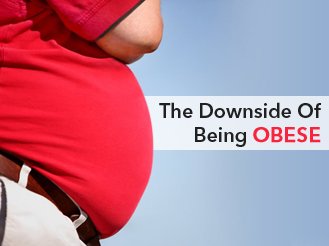The Downside of Being Obese: In the 21st century, obesity has alarmingly affected 5% of the country’s population. A recent study mapping global malnutrition trends has revealed that India has the third-highest number of obese and overweight people (11 % of adolescents, and 20 % of all adults) after US and China.
The Downside of Being Obese: India’s continued integration in the global market has opened the door for a number of unhealthy, processed foods to enter into the market & become that much more accessible to the people.
This, along with the rising middle class incomes, is increasing the average caloric intake per individual among different households.
Obese people are at a major risk of suffering from cardiovascular disease and a number of NGOs, Doctors, Dieticians, Physiotherapists & allied Health Professionals, to come together to raise awareness about this issue.
Three years ago, Yale’s Rudd Center for Food Policy and Obesity conducted a research on perceptions of overweight and underweight individuals. The study received a significant amount of press coverage and demonstrated that overweight women were more likely to be perceived as slow, undisciplined, sloppy, or lazy.
Overweight men are just as likely as overweight women to experience subtle forms of discrimination when applying for a job or shopping at retail stores, according to a study.
The research, which involved two studies, looks at the weight stigmatization or discrimination toward heavy people, especially men.
The Downside of Being Obese: In the first study, non-overweight men applied for jobs at retail stores and the same men applied at different stores wearing overweight prosthetics. The researchers also wanted to investigate if overweight men would be subjected to discrimination as customers, so the same men posed as customers and visited other retail stores. They found that when the men applied for jobs or were shopping as customers in their overweight prosthetics, they experienced more types of subtle discrimination, or what the researchers call “interpersonal discrimination”.
“Employees they interacted with would try to end the interaction early, there was less affirmative behaviour like less nodding or smiling; there was more avoidance types of behaviour like frowning and trying to get out of the interaction,” Ruggs said. The findings suggest that men who are heavy are experiencing really negative behaviours more often than men who are not heavy.
Basically, employees who weigh more are perceived to be lazy and unhealthy, and it’s assumed they are less intelligent because any smart person would know how to lose weight and be healthy.
So, don’t let your weight be your calling card. Make the decision to take necessary steps to get healthy & fit.
Let people see the real you!








